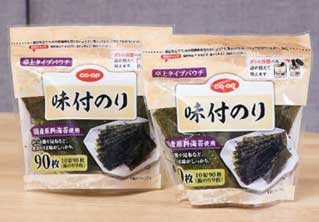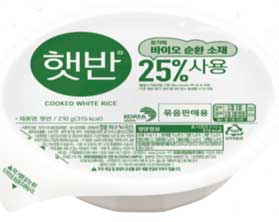Packaging: Suppliers tie up for sustainable seaweed/rice packaging in Japan/South Korea

Materials firms Neste, Mitsui Chemicals and Prime Polymer, a subsidiary of Mitsui Chemicals, are working together to provide more sustainable food packaging solutions for CO-OP, a brand of the Japanese Consumers Co-operative Union (JCCU). In the first phase of the collaboration, bio-based raw materials will replace fossil ones in the production of the packaging material for a seaweed snack. Going forward, the companies intend to introduce bio-based raw materials also to packaging for further products.
“Change begins with small things. In this case, it’s slices of dried seaweed,” says Lilyana Budyanto, Head of Sustainable Partnerships APAC at Neste’s Renewable Polymers and Chemicals business unit. “However, the impact of renewable plastics packaging isn’t small at all. It’s a crucial contributor to the sustainability transformation of the plastics industry and reducing emissions along the value chain. We are looking forward to the cooperation with Mitsui Chemicals, Prime Polymer and JCCU evolving.”
Neste provides renewable Neste RE, a feedstock for polymers that is made entirely from bio-based raw materials. Through Mitsui Chemicals and the company’s subsidiary Prime Polymer, the feedstock is processed into renewable PP under the brand name Prasus, which is then turned into food packaging for JCCU.
The packaging made with renewable materials comes with the same quality and performance as previously, when it was produced from fossil feedstock. The sole differences lie in the reduced carbon footprint of the packaging and the replacement of fossil materials during its production. A mass balancing approach is applied to allocate the renewable material to the plastic packaging. The seaweed snack packaging is the first packaging made with renewable plastics via mass balancing that has received the Japanese Eco Mark certification.

In related news, chemical firm Sabic has announced that a food-contact grade of its Trucircle portfolio of certified renewable PP resins is used in the production of Hetbahn instant white rice packaging bowls by CJ CheilJedang, a South Korea-based global food company. The rigid bowls are the first of their kind using certified renewable PP in a ready-to-eat-rice packaging in Asia Pacific and align with CJ’s strong ‘Nature to Nature’ sustainability roadmap.
Mohammed Al-Zahrani, Vice President of Sabic’s Polypropylene Business, comments: “Food brands around the world are increasingly looking for materials that will help them reduce their carbon footprint without compromising the performance, convenience and food safety of their packaging. Our certified renewable grade from our Trucircle portfolio used in CJ’s Hetbahn rice bowls meet the food-contact regulations, and offers the same ease of processing and high end-use quality as competitive all-virgin polymers.”
The Hetbahn brand, which is one of the top brands in cooked rice and now expanding its product portfolio to include porridge, frozen rice, cooked rice with soup etc, was originally launched in 1996 and means freshly harvested and cooked rice and has changed consumers’ perception of Korean rice meal culture.
The rice grain is polished in a strict raw material process, cooked the same day and packed in a sterile environment so that the delicious tas te of the rice can be preserved. The rice bowls are manufactured by sheet extrusion and subsequent thermoforming. The PP polymer from Sabic has a certified renewable content of 25% and provides the critical attributes of dimensional stability and heat resistance required when microwaving the rice directly in the cup. In addition to this, the used bowls can be returned into the rigid PP recycling stream to recover their material value and enable a more circular packaging industry.
CJ has already started to introduce the new Hetbahn rice bowls in E-Mart stores, one of the largest grocery chains in South Korea.
(PRA)
Subscribe to Get the Latest Updates from PRA Please click here
©2023 Plastics and Rubber Asia. All rights reserved.

©2023 Plastics and Rubber Asia. All rights reserved.
Home Terms & Conditions Privacy Policy Webmail Site Map About Us
















